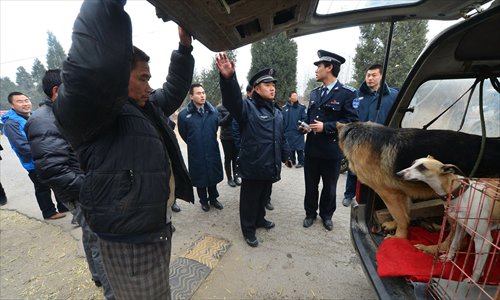HOME >> CHINA
Industrial-scale dog snatchers
Source:Global Times Published: 2015-6-15 21:08:01
Howl of protest over report on canine meat industry

Police officers crack down on illegal dog trade on streets of Beijing in November 2014. Photo: CFP
A four-year investigation into China's dog meat industry, published Wednesday by a Hong Kong-based international NGO called Animals Asia, has exposed the dark side of industry practices, and sparked renewed debate on the legitimacy of the sale and consumption of dog meat.
The investigation, which covered 15 cities in eight provinces in China where dog eating is most prevalent, has uncovered evidence that supports long-standing claims that the majority of "meat dogs" are in fact stolen companion dogs or stray animals.
There is no official data about how many dogs are consumed in China every year.
The report estimates that up to 10 million dogs are killed annually for meat in China though it did not show how they reach that estimation.
The report also noted that few dog meat suppliers have raised the animals by themselves. Instead they purchased dogs from unclear sources, making safety of the food hard to ensure.
The report attracted great public attention. While some support the report and urge the government to investigate, others questioned its credibility.
Stewed Rover
"Our investigations strongly point to what everybody familiar with the industry has long suspected - that the vast majority of China's dog meat comes from stolen companion animals and that misinformation and illegality is rife at every stage of the industry supply chain," said Jill Robinson, Animals Asia founder and CEO.
The investigators found scant evidence of industrial-scale dog breeding for consumption in Jiaxiang county, Shandong, considered one of the country's most active dog-raising areas.
The report also said that many of the about 100 alleged dog farms listed online were actually the same entity with different titles, and none had more than 30 adult dogs on site.
Research findings also show that dogs cannot be cost-effectively farmed on a mass scale.
"There were large breeding farms, but not any more, they couldn't carry on. We also had one of our own before, but we found that the bigger it grew, the more diseases the dogs had, plus the costs were very high. The cost of raising the dogs is higher than the market price of dog meat," an anonymous worker at Fankuai Dog Meat Products in Peixian county, Jiangsu Province, told investigators.
"Our technology now can realize dog farming, but it entails considerable high technology, and it's especially difficult, and once something goes wrong, it causes a large number of deaths. Meat from dogs raised on a farm would be expensive at around 200 yuan per kilogram if everything goes well," Xia Zhaofei, head of Clinical Medicine at the China Agricultural University, said in Beijing in 2014, according to the report.
Between 2011 and 2014, the price of dog meat has fluctuated between 13 and 46 yuan per 0.5 kilogram
Meanwhile, the investigation found a corresponding relation between the demand for dog meat and companion animal thefts.
An astonishing 70 percent of villages surveyed claimed to have suffered mysterious dog losses. Some 75.9 percent of those villagers believe their dog was stolen to supply the dog meat industry. Further evidence supports the claim, with 73.6 percent of dog disappearances occurring during winter, when the demand for dog meat is traditionally the highest.
The result was based on the organization's investigation in 2013, in which a total of 1,468 responses from 771 villages in 28 provinces, autonomous prefectures and municipalities were collected.
The four-year investigation into every stage of the dog meat industry supply chain saw investigators visit more than 110 dog meat retailers, 66 restaurants and food stalls, 21 farmers' markets, 12 dog slaughterhouses, eight dog breeding farms, eight dog meat food companies, four dog collection points, and three large live-animal wholesale markets.
Pack of lies?
The credibility of the report has been challenged by dog suppliers in Peixian county. They say that the investigation is not "impartial" and "accurate," Xuzhou-based newspaper Pengcheng Evening Post reported on Friday.
Fan Xiantao, the head of Fankuai Dog Meat Products and local dog farm association, told the newspaper that the investigators were banned from the local dog farms, so their conclusions are groundless.
Fan added that he might file a lawsuit against the NGO because it damaged their reputation. "I did not go against animal protection or their investigation. But they cannot damage our reputation with such reports."
However, Fan did not reveal that how many dogs his company kept.
The legitimacy of dog meat consumption and the industry that thrives under the high demand for this meat has been hotly debated.
Some experts and netizens argued that the criticism against eating dog meat is only submission to Western cultural hegemony, and that efforts to ban the habit reflects a lack of inclusiveness that does not fit with traditional Chinese culture.
Zu Shuxian, a professor with the Anhui Medical University, argued that eating dog meat has never been part of Chinese culture, reported the People's Daily.
Zu pointed out that dog meat does not have aphrodisiac effects, and instead is not safe to be eaten because dogs were drugged when captured.
Zu said the cross-regional transport of dogs has also increased the risk of diseases such as rabies, because around 38 percent of dogs in rural China receive no vaccinations.
More and more activists from both inside and outside China have recently pushed for stronger law enforcement against consumption and problematic practices in the industry.
Yulin, Guangxi Zhuang Autonomous Region, has drawn international attention with its annual dog-eating festival. But increasing pressure from protestors pushed Yulin authorities in 2014 to enforce food safety laws more stringently. Guangzhou Daily reported last June that the sales of dog meat in Yulin dropped 30 percent from the year before.
Posted in: Society